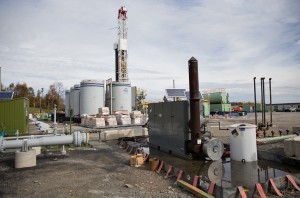Study: residents closer to gas wells report more health issues
-
Katie Colaneri

Lindsay Lazarski / WHYY
A new study found residents living closer to natural gas wells were more likely to report health problems.
A new study has found that residents in western Pennsylvania living close to Marcellus Shale gas drilling sites were twice as likely to report health problems than those living farther away.
Public health researchers from Yale and the University of Washington went door-to-door and surveyed the health of 492 adults and children living in 180 homes in Washington County, southwest of Pittsburgh. Those living within one kilometer, or just over half a mile of natural gas wells reported more skin and upper respiratory problems, such as rashes and nosebleeds.
Study lead author Dr. Peter Rabinowitz admits the report is limited to residents’ own assessment of their health, which isn’t inherently objective.
“We think that our study really adds to some existing evidence that the public health impact has to be considered, that there has to be more studies and better studies of the potential for chemical contamination… from natural gas drilling,” he said.
A spokesman for the Marcellus Shale Coalition, the state’s largest industry trade group, criticized the study as an attempt to put data behind “a pre-determined and biased narrative” and pointed to the researchers’ collaboration with the Southwest Pennsylvania Environmental Health Project – a Washington County-based environmental group.
“To be absolutely clear, the health and safety of our employees and the communities where we operate is our industry’s foremost priority and we remain deeply committed to responsibly developing these clean-burning resources,” he said in a statement.
The study was published in Environmental Health Perspectives last Wednesday and was funded by the Heinz Endowments, the Schmidt Family Foundation and the Claneil Foundation.
*A note of disclosure: StateImpact Pennsylvania receives funding from the Heinz Endowments
















